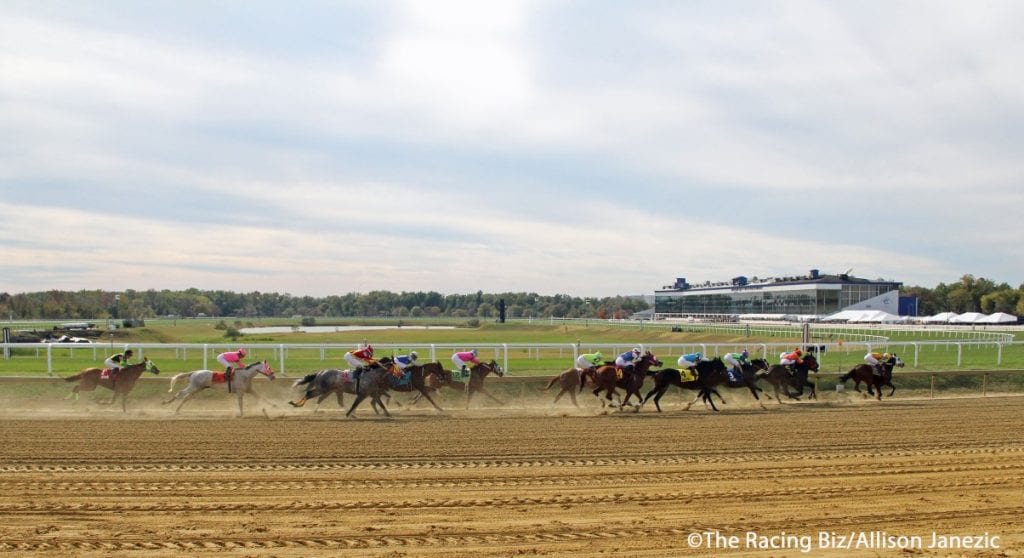MARYLAND SET TO OFFER FIRST JUVENILE RACES OF 2020

Maryland’s experiment in Lasix-free two-year-old racing is set to begin.
The approval, by the state’s Joint Committee on Administrative, Executive & Legislative Review (AELR), of a new regulation forbidding the administration of the anti-bleeder medication furosemide (Lasix) to two-year-old Thoroughbreds within 48 hours of a race, is expected to lead to baby races in the immediate future.
The Maryland Jockey Club texted horsemen on Sunday that it would add “two late breaking extras for Friday, August 7th.” Those are a pair of Lasix-free maiden special weight races for two-year-olds, one for fillies and one open, both at five furlongs. Friday’s races are scheduled to be drawn on Tuesday.
If they fill, they will be the first two-year-old races of 2020 in Maryland, which traditionally has carded juvenile races as early as April. April and May of this year were lost to the Covid-19 pandemic, but with horsemen and the track at odds over Lasix – and the Stronach Group, which owns the Maryland Jockey Club, refusing to card two-year-old races with the medication – June and July went by without a single juvenile race at Laurel Park.
Perhaps the most immediate beneficiary of the Maryland standoff was Delaware Park, which continues to permit Lasix. There, 16 two-year-olds have broken their maidens to date in a meet which began June 17.
In a related matter, the Maryland Racing Commission’s Safety and Welfare Committee on July 31 approved the broad outlines of a Lasix study, though it was not immediately clear what the effect of the approval would be.
- Long trip pays dividends for Alvelo, Tall Order
 Jockey Jean Alvelo flew into Laurel Park from Puerto Rico for a single mount — Tall Order in Friday’s allowance feature. Good thing they made it count.
Jockey Jean Alvelo flew into Laurel Park from Puerto Rico for a single mount — Tall Order in Friday’s allowance feature. Good thing they made it count.
The study was part of an agreement crafted by the Maryland Thoroughbred Horsemen’s Association and the Stronach Group that cleared the way for two-year-old racing to return.
The vaguely worded provision called on the parties “to discuss in good faith… the development, implementation and funding of a study and related protocols for post-race scoping of horses to obtain relevant data.”
The resolution the committee adopted Thursday authorized a study on “the prevalence and severity of exercise-induced pulmonary hemorrhage (EIPH)” in two-year-olds (EIPH is the condition Lasix combats). Under the resolution private veterinarians would perform post-race video endoscopies of each two-year-old racing in Maryland.
The resolution was not particularly more specific than was the provision in the agreement. Committee chair Tom Bowman, a veterinarian by trade, said that did not bother him. “I want everyone to understand that this is not going to be up for a Nobel prize,” he said, adding that the study could be fleshed out over time.
But Dionne Benson, herself a veterinarian and the chief veterinary officer for the Stronach Group, said the lack of specifics in terms of scoring the severity of bleeding, among other issues, was a major concern for her and her employer.
- Stubbornness and support paying off for Tais Lyapustina
 After struggling, jockey Tais Lyapustina has begun to get some opportunities. She credits her supportive network – and her own stubbornness.
After struggling, jockey Tais Lyapustina has begun to get some opportunities. She credits her supportive network – and her own stubbornness.
In fact, both Benson and Steve Koch, the Stronach Group’s senior vice-president of racing, voted against the study as outlined.
That might not normally matter; the vote was 10-3 to proceed, and that’s how, as Bowman noted, democracy works.
But in this case, the Stronach Group is expected to pony up dollars to undertake the study, as is the Maryland Thoroughbred Horsemen’s Association.
The MTHA’s general counsel Alan Foreman congratulated the committee on adopting a resolution he said was in keeping with the original agreement.
“I commend you all for doing it,” he said.
Not so fast, said Alan Rifkin, counsel to the Stronach Group.
“I’m not so sure it does meet the criteria expressed in the agreement,” he countered.
LATEST NEWS















